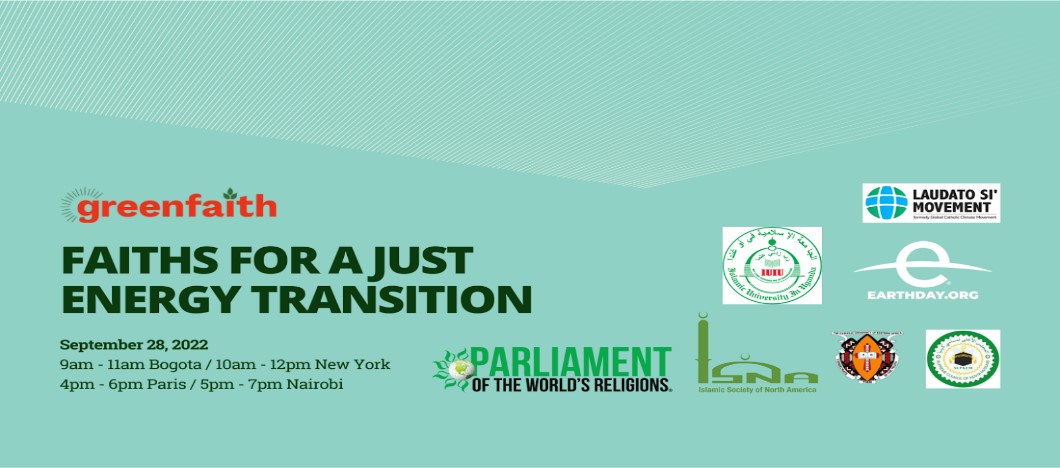
Diverse religious groups from Africa and across the globe today called urgently for a Fossil Fuel Non-Proliferation Treaty, a binding international agreement that would halt new fossil fuel development, require an equitable phase-out of coal, oil, and gas, and commit resources for a just transition to a sustainable future for impacted countries and workers.
During a virtual event co-hosted by the Catholic University of Eastern Africa, the Supreme Council of Kenya Muslims, the Laudato Si Movement, GreenFaith, religious leaders, and grassroots religious activists supported a legally binding treaty, asserting that it reflected a moral, spiritual and practical necessity, given the lack of progress in reducing fossil fuel production.
They also called for people of diverse religions globally to support this call for governments and financial institutions by signing a multi-faith letter to be released prior to COP27.
“The main cause of the climate emergency is fossil fuels,” said Meryne Warah, GreenFaith’s Global Director of Organizing based in Nairobi. “For the sake of life and to prevent massive, cruel levels of suffering, Africa and the world need a binding agreement that stops new fossil fuel projects, phases out existing production, and provides generous support for a transition to a clean energy future and universal access to clean, affordable energy.”
Speakers included leaders active at local, national, and global levels. Religious activists Hilda Nakabuye from Uganda, who works with Fridays for Future in opposition to the East Africa Crude Oil Pipeline, and Frances Namoumou, based in Fiji, of the Pacific Council of Churches, which actively supports the call for a Fossil Fuel Non-Proliferation Treaty, spoke about the devastating impacts of fossil fuel development and climate change in their communities.
“In the Pacific Islands, people are already losing their homes, jobs, and communities due to rising sea levels,” said Namoumou. “To be faithful to their religious beliefs,” said Nakabuye, “people of faith need to call for an end to fossil fuels and a just transition for all.”
In a keynote address, Rev. Dr. Joshtrom Kureethadam of the Vatican Dicastery for Integral Human Development reiterated the Vatican’s recent support for a Treaty. Sheikh Yussuf Nassur, Religious Leader of the Supreme Council of Kenya Muslims, noted that continued reliance on fossil fuels directly opposes Islam’s central teachings, known as Maqasid Shariah. “Historically and presently, those hit first and worst by climate change in Africa and worldwide have a tiny carbon footprint. Why should they suffer while the world’s largest corporations and wealthy governments fail to act?”
“I signed the Fossil Fuels Non-Proliferation Treaty because weaning ourselves off of our dependency on fossil fuels is not only a vital first step in reversing the horrific damage we have done to this planet. I believe it is also my Islamic duty,” said Imam Zaid Shakir.
The event served as a kick-off of a period of heightened intensity in public religious activism for climate justice. Throughout October, grassroots religious groups globally are carrying out actions in France, East Africa, the US, Indonesia, Australia and elsewhere to protest new fossil fuel projects and to call on the world’s largest asset managers to end support for climate-destructive projects. This global, month-long series of actions is organized by the GreenFaith International Network.
The Catholic community is also marking the release of the upcoming film on Laudato Si, “The Letter” telling the story of the Laudato Si’ encyclical letter and the unfolding ecological emergency. It’s the fruit of several years of work of Laudato Si’ Movement in partnership with Off the Fence (Oscar-winning producers of My Octopus Teacher) and the Vatican, premiering on October 4th.
The Fossil Treaty Initiative began in 2017 when the Least Developed Countries (LDC) group at COP23 stressed the need for: “an increase in ambition by all countries to put us on track to limit the global temperature increase to 1.5 degrees Celsius by strengthening our national contributions, managing a phase-out of fossil fuels, promoting renewable energy and implementing the most ambitious climate action.”
Recently, the President of Vanuatu, His Excellency Nikenike Vurobaravu, made his country the first nation-state to call for a Fossil Fuel Non-Proliferation Treaty during his speech at the recent UN General Assembly.
Beginning in 2021, Laudato Si’ Movement and GreenFaith have played lead roles in supporting a call by faith groups in support of a binding treaty. Such a compact would require an immediate end to new fossil fuel projects, a fair phase-out of fossil fuels, and a just transition for workers and communities, including universal access to clean energy.
The Treaty Initiative has attracted support from over 100 Nobel Laureates (including the Dalai Lama), 40+ cities, 250+ parliamentarians, 1,000+ NGOs, and 2,000+ scientists and academics. “Religious groups have provided influential past support for international treaties in the past, most notably the Paris Agreement and the Nuclear Non-Proliferation Treaty,” said Ashley Kitsiya of Laudato Si’ Movement. “We have a legacy of vigorous public engagement that we intend to bring to the climate issue.”










